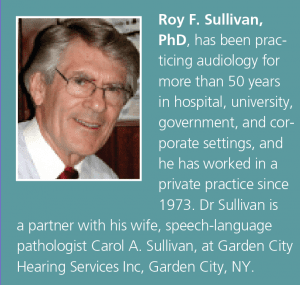Monday mornings at our weekend Connecticut home typically involve an early morning session with my Pilates trainer followed by visits to local merchants. Stocking up at one of the local supermarkets, I always end my acquisitions at the deli counter where Jim, a tall, thin, stern-faced gentleman in his late 70s with a hearing impairment that has progressed notably over the years, always fills my order. On this post-snowpocalyptic, March Monday morning, the dialogue went something like this:
Jim: “Number 21?”
“Here.”
Jim: “Number 21?”
(Louder) “That’s me. Morning, Jim.”
Jim: “What can I get you?”
“A pound of tuna salad, please.”
Jim: (Leaning over the counter to hear) “What?”
(louder) “A pound of tuna salad.”
Jim: (Leaning further over the counter) “A pound?”
(Settling in at 80 dB spl speech output) “Yes, Jim, one pound.”
Jim: (after packaging the tuna) “Anything else?”
“A pound of crunchy vegetable salad.”
Jim: “Macaroni salad?”
“No, Jim, CRUNCHY VEGETABLE SALAD.”
Jim: “Oh.”; (after packaging the crunchy vegetable salad) “What else?”
“A half-pound of rosemary ham.”
Jim: “One pound?”
“No, just a half-pound.”
Jim: (Gets the ham, puts it on the slicer and offers me a sample) “Thick enough?”
“Perfect”
Jim: “What?”
“Okay.”
Jim: (slices, packages and labels and hands me the ham.) “What else?”
(I am now the only customer at the deli counter.) “Jim, are you a veteran?”
Jim: “Yes, why do you ask?”
(Pulling my black Starkey wireless IICs from both ears; Disclosure: I don’t practice in Connecticut.) “Because you can get these for free at the V.A.”
Jim: (Bristling and moving away) “You won’t have to put up with me much longer, I’m retiring”
“I’ve always appreciated your help Jim and am just trying to offer some in return. I’m sorry to hear you are leaving.”
Jim: (No eye contact)“Have a good one.”
In this frequently repaired, ad hoc conversational exchange, I became the de facto, enabling Communicatively Significant Other (CSO). My well-intentioned, unsuccessful attempt to influence the listener’s self-perception and denial of need for improved hearing obviously struck a nerve. Jim’s defensive response indicates that he is, in fact, aware of his hearing impairment. Rejecting his Veteran’s Administration status for hearing aid access suggests that financial need is not a major contributing factor in his decision-making process. Hearing impairment may be just one, among a number of other reasons, motivating him to choose retirement over seeking hearing help to ensure a more comfortable continued employment with daily public contact. One wonders if there are close, consistent, and caring CSOs in Jim’s daily life. If so, what has been the extent of their input and influence with intervention? “None so deaf as those that will not hear. None so blind as those that will not see.” (Matthew Henry, English clergyman 1662-1714).
To read more on the topic of “Whattage,” the frequency with which a listener uses “What?”, cognate words, or behaviors that prompt repetitions by a CSO, please click here for Roy Sullivan’s June 6, 2017 article for Hearing Review.
Image: © Kiosea39 | Dreamstime






